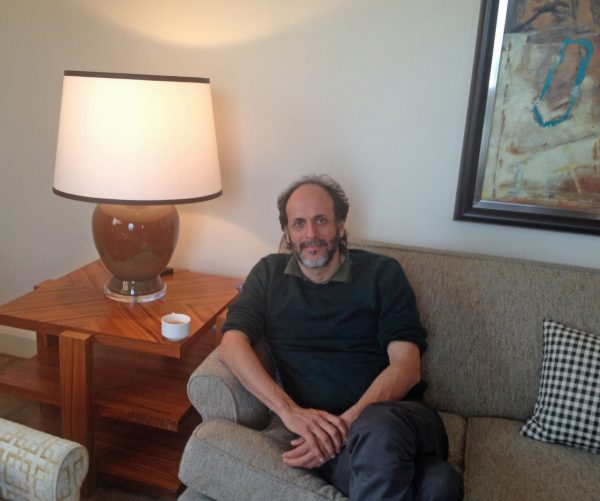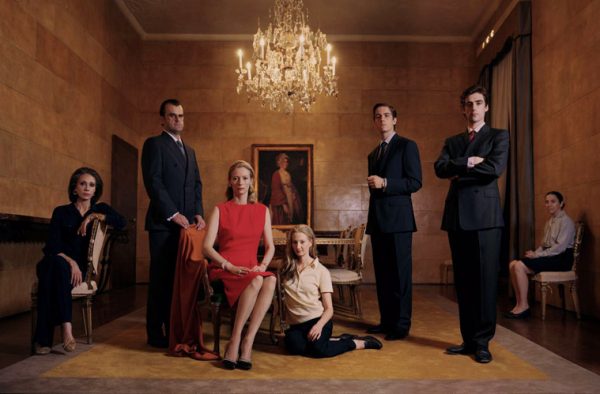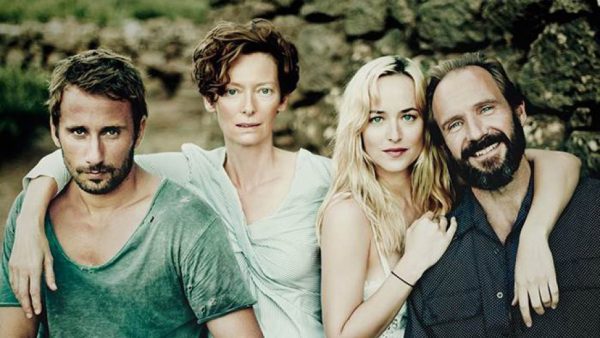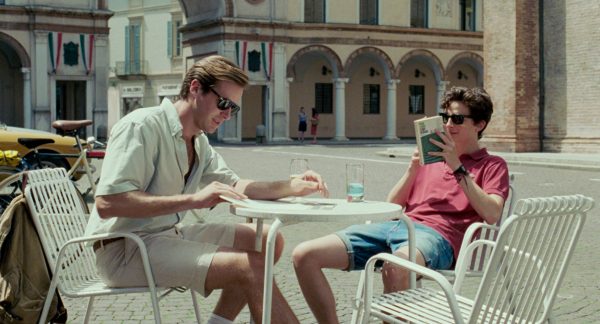Call Me by Your Name, directed by Luca Guadagnino from the 2007 American novel by André Aciman, has been attracting critical praise ever since it premiered at Sundance in January. It was presented at Berlinale in February and at the Toronto Film festival in September. On November 21, it received 6 nominations for the 2018 Film Independent Spirit Awards: Best Feature, Best Director for Luca Guadagnino, Best Male Lead for Timothée Chalamet, Best Supporting Male for Armie Hammer, Best Cinematography for Sayombhu Mukdeerprom, Best Editing for Walter Fasano. It opens in Los Angeles November 23 at AMC, Arclight and Landmark.

When I interview the director in Beverly Hills (we speak in Italian, our native language), he explains how in retrospect he realizes that his latest film forms “a trilogy of desire” with his previous films, Io sono l’amore (I Am Love, 2010) and A Bigger Splash (2015).

In I Am Love Emma (Tilda Swinton), a married woman from a prominent Milanese family, with three grown children, falls in love with a younger man from a lower social class, a chef friend of her son Edoardo, thereby upsetting her husband and her family life. Her son falls in the pool, hits his head and dies. Luca says that, in pursuit of “her desire for a sense of inner freedom, she destroys everything that she had built until then.”

In A Bigger Splash, a rock star (Tilda Swinton), who lost her voice and is vacationing with her lover (Matthias Schoenaerts) in the Sicilian island of Pantelleria, is visited by her former lover (Ralph Fiennes) and his daughter (Dakota Johnson). The two men experience an intense rivalry, and one of them ends up drowned in the pool. Luca says, “her desire to recapture a lost love, which is impossible, causes a deadly fracture.” The story was inspired by the French movie La Piscine (1969) with Alain Delon, Romy Schneider, Maurice Ronet, Jane Birkin, and by the 1967 painting by David Hockney.
In Call Me by Your Name, Elio (Timothée Chalamet), a teenager spending the summer of 1983 in his family villa in Moscazzano near Crema, Lombardy (where Guadagnino lives in a 17th century palazzo, not in Bordighera, Liguria, like in the novel), has his first sexual encounter with a girl, then falls in love with Oliver (Armie Hammer), an American graduate student assisting his father (Michael Stuhlbarg), a professor of Greco-Roman Archeology. Luca says, “the desire of Elio for Oliver is mutual and produces a positive change,” therefore, rather than bringing about “destruction and a radical, final change,” it has a “benign influence on both young men.” They do swim in a small pool but nobody drowns. This as an idyllic love story of youth, “tender and uplifting,” so “my approach was more poetic, like a box of chocolates.”
Luca Guadagnino (born August 10, 1971, in Palermo, Sicily) graduated from Sapienza University in Rome with a thesis on American director Jonathan Demme. He started as a film critic and remains a passionate cinephile. He dedicates Call Me by Your Name to his cinematic heroes that inspired it: Bernando Bertolucci, Jean Renoir, Jacques Rivette, Éric Rohmer, André Techiné.

What impressed me the most about this film is its sensual evocation of the leisurely Italian lifestyle of unhurried meals outdoors, sitting at a large table chatting with family and friends for hours, swimming in the river, bicycling to town, playing tennis, reading books, listening to classical music. It reminds me of my summers spent in Modena and its countryside growing up in Italy as a teenager in the 1960s. Luca reflects that this lazy summer in “the specific Italian countryside with its farmhouses, streams and canals,” when there is a lack of too many things to do, allows you “to let yourself go to the environment, to the landscape and to your feelings.”

When I interview the 21-year-old Timothée Chalamet for Lady Bird, where he plays Saoirse Ronan’s high school boyfriend, I discover that in real life it’s his mother who’s Jewish American and his father French (while in the film his mother is French and his father American), and he grew up in New York, where he attended the Fiorello LaGuardia high school of Performing Arts, but he spent his summers in a small town in France, Le Chambon-sur-Lignon, where the lifestyle is not so different from Italy or Spain. He calls it “joie de vivre”. There’s “aperitivo before lunch and espresso after, fresh fruit, a piece of bread with Nutella, and that gives you a sense of stillness and calm.”
Timothée describes the romance between the two young men as “a fiery and passionate summer love.” That is the universal appeal of this story of first love, says Luca, everyone can identify with that “beautiful feeling of butterflies in the stomach.”
The depiction of gay love stories in movies and television has come a long way since Brokeback Mountain (2005), directed by Ang Lee from the 1997 short story by Annie Prouxl. The 2007 novel Call Me by Your Name was embraced by the LBGT community as a landmark of gay literature.
I ask the director his opinion as to why gay marriage is still not allowed in Italy, despite having been legalized in the Netherlands in 2000, in Spain in 2005, in Norway and Sweden in 2009, in Portugal in 2010, in England and France in 2013, in Germany in 2017. I attribute it to the power of the Catholic Church, but Luca disagrees, citing the example of the very Catholic Ireland, where same-sex marriage has been legal since 2015. “I believe the problem is the cowardice of politicians, the double moral standard between public virtues and private vices. But inevitably the progress of human rights will sooner or later force Italy to confront this issue, as it happened in the United States and in the rest of the world.”
